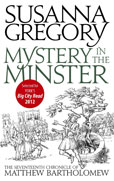 The Seventeenth Chronicle of Matthew Bartholomew
The Seventeenth Chronicle of Matthew Bartholomew
Murder, madness and mayhem in the ancient city of York.
In 1358, the College of Michaelhouse at the University of Cambridge is in desperate need of extra funds – again. A legacy from the Archbishop of York, of a parish church close to that city, promises to be a welcome source of income. However, there has been another claim to its ownership, and it seems that the only way to settle the dispute is for a deputation from Michaelhouse to travel north.
Matthew Bartholomew is among the small party that arrives in the bustling city, where the increasing wealth of the merchants is unsettling the established order, and where a French invasion is an ever-present threat to its port. He is both impressed and appalled by what he finds in the teeming streets, the magnificent buildings and the behaviour of its citizens, but he and his colleagues are soon distracted by learning that several of the Archbishop’s executors have died in unexplained circumstances, and that the codicil naming Michaelhouse as a beneficiary cannot be found.
As they search the Minster’s chaotic library and evade the determination of those who believe the legacy should go elsewhere, it seems that even God is against their mission, sending a spring storm of such biblical proportion that the river waters surrounding the great city threaten its very fabric. But it is human wrath that is likely to spill their blood …
Amazon.co.ukHardcoverKindle EditionWaterstoneseBook
Amazon.comUS HardcoverUS Kindle Edition
Extract
The Archbishop’s Palace, Cawood, near York, 19 July 1352
William Zouche was dying. He had been unwell before the plague had swept across the country three years before, and had been sorry that the disease should have spared him, a sick man weary from a life of conflict and tangled politics, but had snatched away younger, more righteous souls.
He was not afraid to die, although he was worried about how his sins would be weighed. He had tried to live a godly life, and had been a faithful servant of the King, even fighting a battle on his behalf and helping to win a great victory over the Scots at Neville’s Cross. It was hardly seemly for an Archbishop of York to indulge in warfare, though, and he regretted his part in the slaughter now, just as he regretted some of the other things he had done in the name of political expediency.
He was particularly sorry for some of the exploits undertaken by two of his henchmen, although he knew they had been necessary to ensure the smooth running of his diocese. But would God see it that way, or would He point out that the same end could have been achieved more honestly or gently?
Opening his eyes, Zouche saw his bedchamber was full of people – officials from his minster, representatives from the Crown, chaplains, town worthies, members of his family and servants – all waiting for the old order to finish so they could turn their attention to the new. He was simultaneously saddened and gratified to see a number in tears. For all his faults, he was popular, and many were friends as well as colleagues, kin and subordinates.
His gaze lit on his henchmen – clever Myton the merchant, weeping openly and not caring who saw his grief, and dear, devoted Langelee, keeping his emotions in check by staring fixedly at the ceiling. Seeing them turned Zouche’s mind again to his sins, and the time his soul might have to spend in Purgatory. It was a concern that had been with him since the horror of Neville’s Cross, so he had started to build himself a chantry chapel in the minster, where daily prayers could be said for him – prayers that would shorten his ordeal in the purging fires, and speed him towards Heaven.
‘You will see it is completed?’ he asked his executors, the nine men he had appointed to ensure his last wishes were carried out. He loved them all, and had been generous to them in the past with gifts of money, privileges and promotion. He trusted them to do what he wanted, but his chapel was important enough to him that he needed to hear their assurances once again.
‘Of course,’ replied his brother Roger gently. ‘None of us will rest until your chantry is ready.’
‘And you will see me buried there? You will put me in the nave for the time being, but when my chapel is completed, you will move my bones into it?’
They nodded, several turning away, not wanting him to see their distress at this bald reminder of his mortality. Reassured, Zouche leaned back against the pillows. Now he could die in peace.

